- Clone
- MEL-14 (See other available formats)
- Regulatory Status
- RUO
- Other Names
- L-selectin, LECAM-1, Ly-22, LAM-1, MEL-14
- Isotype
- Rat IgG2a, κ
- Ave. Rating
- Submit a Review
- Product Citations
- publications
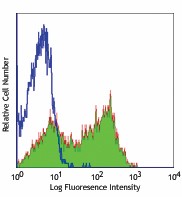
-

C57BL/6 mouse splenocytes were stained with Ultra-LEAF™ purified CD62L (clone MEL-14) (filled histogram) or rat IgG2a isotype control (open histogram), followed by anti-rat IgG FITC.
CD62L is a 74-95 kD glycoprotein also known as L-selectin, LECAM-1, Ly-22, LAM-1, and MEL-14. It is a member of the selectin family and is expressed on the majority of B and naïve T cells, a subset of memory T cells, monocytes, granulocytes, most thymocytes, and a subset of NK cells. CD62L is important in lymphocyte homing to high endothelial venules (HEV) in peripheral lymph nodes and leukocyte "rolling" on activated endothelium. CD62L also contributes to neutrophil emigration at inflammatory sites. CD62L is rapidly shed from lymphocytes and neutrophils upon cellular activation and the expression levels of CD62L (in conjunction with other markers) have been used to distinguish naïve, effector, and memory T cells. CD62L has been reported to interact with CD34, GlyCAM-1, and MAdCAM-1.
Product DetailsProduct Details
- Verified Reactivity
- Mouse
- Antibody Type
- Monoclonal
- Host Species
- Rat
- Immunogen
- C3H/eb mouse B lymphoma 38C-13
- Formulation
- 0.2 µm filtered in phosphate-buffered solution, pH 7.2, containing no preservative.
- Endotoxin Level
- Less than 0.01 EU/µg of the protein (< 0.001 ng/µg of the protein) as determined by the LAL test.
- Concentration
- The antibody is bottled at the concentration indicated on the vial, typically between 2 mg/mL and 3 mg/mL. Older lots may have also been bottled at 1 mg/mL. To obtain lot-specific concentration and expiration, please enter the lot number in our Certificate of Analysis online tool.
- Storage & Handling
- The antibody solution should be stored undiluted between 2°C and 8°C. This Ultra-LEAF™ solution contains no preservative; handle under aseptic conditions.
- Application
-
FC - Quality tested
CyTOF® - Verified
IHC-F, IP, CMCD, Block - Reported in the literature, not verified in house - Recommended Usage
-
Each lot of this antibody is quality control tested by immunofluorescent staining with flow cytometric analysis. For flow cytometric staining, the suggested use of this reagent is ≤ 0.25 µg per million cells in 100 µL volume. It is recommended that the reagent be titrated for optimal performance for each application.
- Application Notes
-
Additional reported applications (for the relevant formats) include: immunoprecipitation1-3, complement-dependent cytotoxicity4, in vivo and in vitro blocking of adhesion1-3,5, and immunohistochemical staining of acetone-fixed frozen sections and zinc-fixed paraffin-embedded sections6. The Ultra-LEAF™ purified antibody (Endotoxin < 0.01 EU/µg, Azide-Free, 0.2 µm filtered) is recommended for functional assays (Cat. Nos. 104457-104462).
-
Application References
(PubMed link indicates BioLegend citation) -
- Gallatin WM, et al. 1983. Nature 304:30. (IP, Block)
- Siegelman MH, et al. 1990. Cell 61:611. (IP, Block)
- Lewinsohn DM, et al. 1987. J. Immunol. 138:4313. (IP, Block)
- Iwabuchi K, et al. 1991. Immunobiology 182:161. (CMCD)
- Pizcueta P, et al. 1994. Am. J. Pathol. 145:461.
- Reichert RA, et al. 1986. J. Immunol. 136:3535. (IHC, FC)
- Olver S, et al. 2006. Cancer Res. 66:571.
- Fukushima A, et al. 2006. Invest. Ophthalmol. Vis. Sci. 47:657. PubMed
- Benson MJ, et al. 2007. J. Exp. Med. doi:10.1084/jem.20070719. (FC) PubMed
- Chappaz S, et al. 2007. Blood doi:10.1182/blood-2007-02-074245. (FC) PubMed
- Lee JW, et al. 2006. Nature Immunol. 8:181.
- Shigeta A, et al. 2008. Blood 112:4915 (FC) PubMed
- de Vries VC, et al. 2009. Am. J. Transplant. 9:2270 PubMed
- RRID
-
AB_2832325 (BioLegend Cat. No. 104457)
AB_2832326 (BioLegend Cat. No. 104458)
AB_2832327 (BioLegend Cat. No. 104459)
AB_2832328 (BioLegend Cat. No. 104460)
AB_2832329 (BioLegend Cat. No. 104461)
AB_2832330 (BioLegend Cat. No. 104462)
Antigen Details
- Structure
- Selectin, 95 kD (neutrophils) or 74 kD (lymphocytes)
- Distribution
-
Subsets of B and T cells, monocytes, granulocytes, subset of NK cells
- Function
- Lymphocyte homing to HEV, rolling on activated endothelium
- Ligand/Receptor
- CD34, GlyCAM-1, MAdCAM-1
- Cell Type
- B cells, Granulocytes, Monocytes, Neutrophils, NK cells, T cells, Tregs
- Biology Area
- Cell Adhesion, Cell Biology, Costimulatory Molecules, Immunology, Innate Immunity
- Molecular Family
- Adhesion Molecules, CD Molecules
- Antigen References
-
1. Barclay AN, et al. 1997. The Leukocyte Antigen FactsBook Academic Press.
2. Kishimoto TK, et al. 1990. P. Natl. Acad. Sci. USA 87:2244.
3. Tedder TF, et al. 1995. J. Exp. Med. 181:2259. - Gene ID
- 20343 View all products for this Gene ID
- UniProt
- View information about CD62L on UniProt.org
Related FAQs
- Do you guarantee that your antibodies are totally pathogen free?
-
BioLegend does not test for pathogens in-house aside from the GoInVivo™ product line. However, upon request, this can be tested on a custom basis with an outside, independent laboratory.
- Does BioLegend test each Ultra-LEAF™ antibody by functional assay?
-
No, BioLegend does not test Ultra-LEAF™ antibodies by functional assays unless otherwise indicated. Due to the possible complexities and variations of uses of biofunctional antibodies in different assays and because of the large product portfolio, BioLegend does not currently perform functional assays as a routine QC for the antibodies. However, we do provide references in which the antibodies were used for functional assays and we do perform QC to verify the specificity and quality of the antibody based on our strict specification criteria.
- Does BioLegend test each Ultra-LEAF™ antibody for potential pathogens?
-
No, BioLegend does not test for pathogens in-house unless otherwise indicated. However, we can recommend an outside vendor to perform this testing as needed.
- Have you tested this Ultra-LEAF™ antibody for in vivo or in vitro applications?
-
We don't test our antibodies for in vivo or in vitro applications unless otherwise indicated. Depending on the product, the TDS may describe literature supporting usage of a particular product for bioassay. It may be best to further consult the literature to find clone specific information.
Other Formats
View All CD62L Reagents Request Custom ConjugationCompare Data Across All Formats
This data display is provided for general comparisons between formats.
Your actual data may vary due to variations in samples, target cells, instruments and their settings, staining conditions, and other factors.
If you need assistance with selecting the best format contact our expert technical support team.
-
APC anti-mouse CD62L
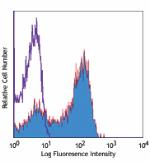
C57BL/6 mouse splenocytes were stained with CD62L (clone MEL... -
Biotin anti-mouse CD62L
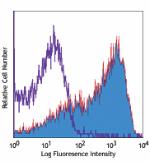
C57BL/6 mouse splenocytes were stained with biotinylated CD6... -
FITC anti-mouse CD62L
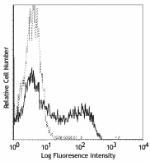
C57BL/6 bone marrow cells stained with MEL-14 FITC -
PE anti-mouse CD62L
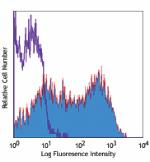
C57BL/6 mouse splenocytes stained with MEL-14 PE -
PE/Cyanine5 anti-mouse CD62L
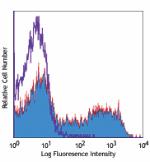
C57BL/6 mouse bone marrow cells were stained with CD62L (clo... -
Purified anti-mouse CD62L
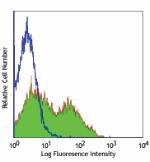
C57BL/6 mouse splenocytes stained with purified MEL-14, foll... 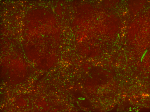
Fresh, frozen mouse spleen was stained with purified CD62L c... -
PE/Cyanine7 anti-mouse CD62L
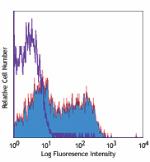
C57BL/6 mouse splenocytes were stained with CD62L (clone MEL... -
Alexa Fluor® 488 anti-mouse CD62L
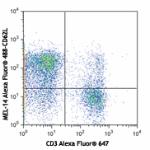
C57BL/6 mouse splenocytes were stained with CD3 Alexa Fluor®... 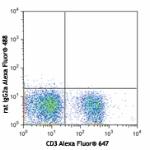
-
Alexa Fluor® 647 anti-mouse CD62L
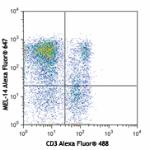
C57BL/6 mouse splenocytes were stained with CD3 Alexa Fluor®... 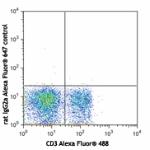
-
Pacific Blue™ anti-mouse CD62L
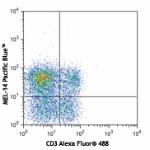
C57BL/6 mouse splenocytes were stained with CD3 Alexa Fluor&... 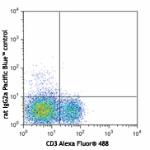
-
Alexa Fluor® 700 anti-mouse CD62L
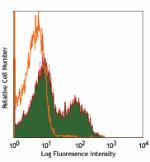
C57BL/6 mouse bone marrow cells were stained with CD62L (clo... -
APC/Cyanine7 anti-mouse CD62L
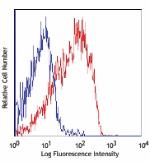
C57BL/6 mouse splenocytes were stained with CD62L (clone MEL... -
PerCP/Cyanine5.5 anti-mouse CD62L

C57BL/6 mouse splenocytes were stained with CD3e APC and CD6... -
PerCP anti-mouse CD62L
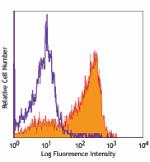
C57BL/6 mouse bone marrow cells were stained with CD62L (clo... -
Brilliant Violet 421™ anti-mouse CD62L
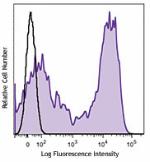
C57BL/6 mouse bone marrow cells were stained with CD62L (clo... -
Brilliant Violet 570™ anti-mouse CD62L
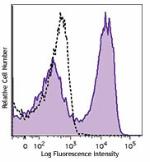
C57BL/6 mouse bone marrow cells were stained with CD62L (clo... -
Brilliant Violet 605™ anti-mouse CD62L
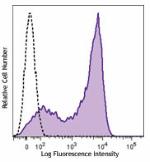
C57BL/6 mouse splenocytes cells were stained with CD62L (clo... -
Brilliant Violet 510™ anti-mouse CD62L
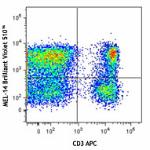
C57BL/6 mouse splenocytes were stained with CD3 APC and CD62... -
Purified anti-mouse CD62L (Maxpar® Ready)
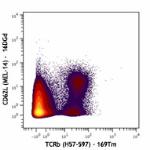
Mouse splenocytes stained with 169Tm-anti-TCRβ (H57-597) and... -
Brilliant Violet 711™ anti-mouse CD62L
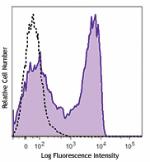
C57BL/6 mouse bone marrow cells were stained with CD62L (clo... -
Brilliant Violet 785™ anti-mouse CD62L
C57BL/6 mouse splenocytes were stained with CD3 FITC and CD6... -
PE/Dazzle™ 594 anti-mouse CD62L
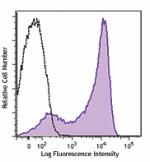
C57BL/6 mouse splenocytes were stained with CD62L (clone MEL... -
APC/Fire™ 750 anti-mouse CD62L
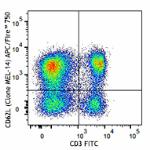
C57BL/6 mouse splenocytes were stained with CD3 FITC and CD... 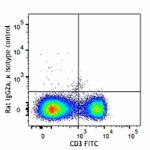
-
TotalSeq™-A0112 anti-mouse CD62L
-
Brilliant Violet 650™ anti-mouse CD62L

C57BL/6 mouse splenocytes were stained with CD3 FITC and CD6... -
TotalSeq™-C0112 anti-mouse CD62L
-
Ultra-LEAF™ Purified anti-mouse CD62L
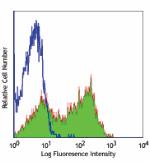
C57BL/6 mouse splenocytes were stained with Ultra-LEAF™ puri... -
KIRAVIA Blue 520™ anti-mouse CD62L

C57BL/6 mouse splenocytes were stained with CD3e APC and CD6... -
TotalSeq™-B0112 anti-mouse CD62L
-
Spark Red™ 718 anti-mouse CD62L (Flexi-Fluor™)
 Login / Register
Login / Register 






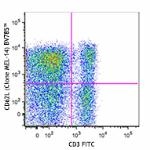
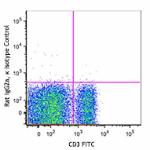



Follow Us